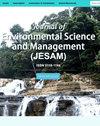Socio-economic Impacts of Smallholder Tree Farming in the Caraga Administrative Region, Philippines
IF 0.3
4区 环境科学与生态学
Q4 ENVIRONMENTAL SCIENCES
Journal of Environmental Science and Management
Pub Date : 2020-12-30
DOI:10.47125/jesam/2020_sp2/07
引用次数: 2
Abstract
Tree farming is becoming infamous among smallholders in the Caraga Administrative Region, the acclaimed “timber corridor” of the Philippines. Despite the region’s favorable bio-physical condition to tree farming, attractive cash benefits, and market availability compared to other regions of the country, tree farming has become less attractive to smallholders. The smallholders remained poor and marginalized even as the region’s poverty incidence continually declined in the last three decades. This study seeks to determine the socioeconomic impacts of smallholder tree farming in the region. Using both qualitative and quantitative analyses, the study revealed that tree and non-tree farmers alike perceived positive and statistically significant changes on livelihood sources, income, equity, asset accumulation, education, level of trust, reciprocity and cohesiveness in the community as a result of tree farming. However, although income was improved with tree farming, benefits were considered inequitable among different stakeholders; those endowed with financial capital captured much of the economic benefits. Worse, the lack of financial resources has led some smallholder tree farmers to accommodate arrangements such as dependence on the purchase order (PO) holders who have control over the price of logs that put them into a disadvantaged situation, which consequently locked them in impoverished condition. The study recommends the institutionalization of an effective need-oriented extension program for smallholder tree farmers, investment in market diversification and vertical integration of tree products to make smallholder tree farming more sustainable and equitable.菲律宾卡拉加行政区小农树木种植的社会经济影响
在菲律宾备受赞誉的“木材走廊”卡拉加行政区的小农户中,植树造林正变得臭名昭著。尽管与该国其他地区相比,该地区对植树造林有着有利的生物物理条件、有吸引力的现金效益和市场可用性,但植树造林对小农户的吸引力已经降低。尽管该地区的贫困率在过去三十年中不断下降,但小农户仍然贫穷和被边缘化。本研究旨在确定该地区小农户植树造林的社会经济影响。通过定性和定量分析,该研究表明,植树造林和非植树造林的农民都认为,由于植树造林,社区在生计来源、收入、公平、资产积累、教育、信任水平、互惠和凝聚力方面发生了积极和统计上显著的变化。然而,尽管植树造林提高了收入,但不同利益攸关方之间的利益被认为是不公平的;那些拥有金融资本的人获得了大部分经济利益。更糟糕的是,由于缺乏财政资源,一些小农户不得不接受一些安排,例如依赖控制原木价格的采购订单持有人,这使他们处于不利地位,从而使他们陷入贫困。该研究建议为小农户制定一项有效的以需求为导向的推广计划,投资于市场多元化和树木产品的垂直整合,以使小农户的树木种植更加可持续和公平。
本文章由计算机程序翻译,如有差异,请以英文原文为准。
求助全文
约1分钟内获得全文
求助全文
来源期刊

Journal of Environmental Science and Management
ENVIRONMENTAL SCIENCES-
CiteScore
0.90
自引率
0.00%
发文量
10
审稿时长
2 months
期刊介绍:
The Journal of Environmental Science and Management (JESAM) is an international scientific journal produced semi-annually by the University of the Philippines Los Baños (UPLB).
JESAM gives particular premium to manuscript submissions that employ integrated methods resulting to analyses that provide new insights in environmental science, particularly in the areas of:
environmental planning and management;
protected areas development, planning, and management;
community-based resources management;
environmental chemistry and toxicology;
environmental restoration;
social theory and environment; and
environmental security and management.
 求助内容:
求助内容: 应助结果提醒方式:
应助结果提醒方式:


